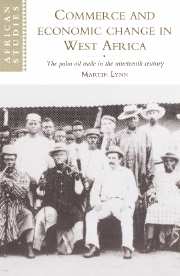Book contents
- Frontmatter
- Contents
- List of maps
- List of tables
- Preface
- List of abbreviations
- Introduction
- Part I The development of the palm oil trade in the first half of the nineteenth century
- Part II The restructuring of the palm products trade in the second half of the nineteenth century
- 5 Technological change, the British market, and African producers
- 6 British traders and the restructuring of the palm products trade
- 7 African brokers and the struggle for the palm products trade
- 8 The coming of colonial rule and the ending of legitimate trade
- Conclusion
- Notes
- Select bibliography
- Index
- Other books in the series
8 - The coming of colonial rule and the ending of legitimate trade
Published online by Cambridge University Press: 04 December 2009
- Frontmatter
- Contents
- List of maps
- List of tables
- Preface
- List of abbreviations
- Introduction
- Part I The development of the palm oil trade in the first half of the nineteenth century
- Part II The restructuring of the palm products trade in the second half of the nineteenth century
- 5 Technological change, the British market, and African producers
- 6 British traders and the restructuring of the palm products trade
- 7 African brokers and the struggle for the palm products trade
- 8 The coming of colonial rule and the ending of legitimate trade
- Conclusion
- Notes
- Select bibliography
- Index
- Other books in the series
Summary
The opening of the palm oil trade from 1852, followed by the subsequent contraction of the British oil market, had by the 1880s culminated in major problems for all those involved in the palm products trade. This had important implications for Anglo-West African relations. This is no place to examine either British imperial policy or proconsular practice in West Africa, but it is important to look at the way the restructuring of the trade in the second half of the century led to changes in the relationship between British palm product traders and their African suppliers, and particularly to changes in the attitudes of British traders towards political intervention on the west coast. By the 1880s earlier attitudes that had been largely indifferent to ideas of political expansion had begun to change among Liverpool firms, moving towards support for political intervention in those areas – particularly the Niger Delta – that lay at the heart of the palm products trade. Some traders at least had by the 1880s come to see political intervention as a solution to the economic problems facing the trade. This was to have major long-term implications for the future of the coastal palm products brokers.
This change in attitudes was in fact a long time coming. In the period up to c. 1880 British palm products traders – and particularly the established Liverpool firms like Harrisons, Horsfalls, and Hatton & Cookson – had remained largely neutral to notions of British political annexations in West Africa or of removing the brokers of the coast. Those who supported territorial expansion or contemplated moves inland were either newcomers to the trade who wished to undermine the position of the established firms, or Krio traders who saw British influence, …
- Type
- Chapter
- Information
- Commerce and Economic Change in West AfricaThe Palm Oil Trade in the Nineteenth Century, pp. 171 - 187Publisher: Cambridge University PressPrint publication year: 1997

